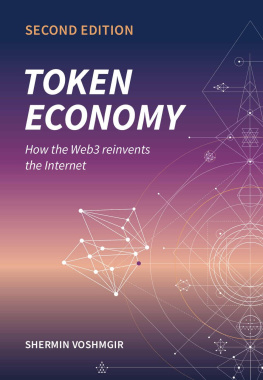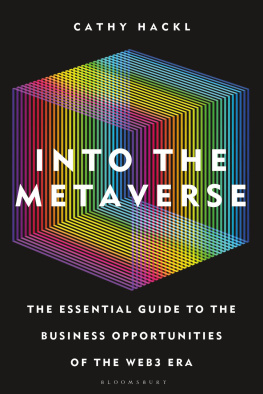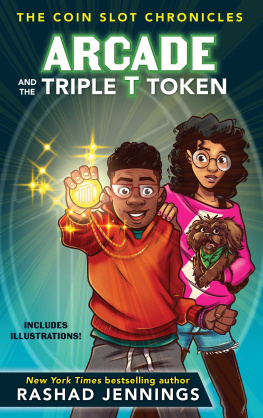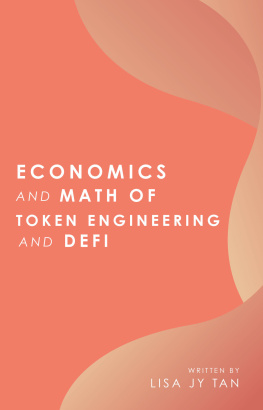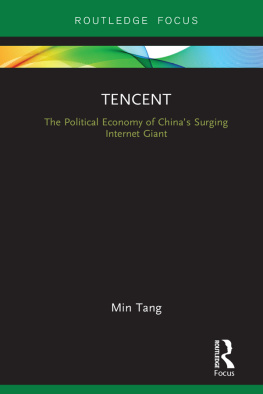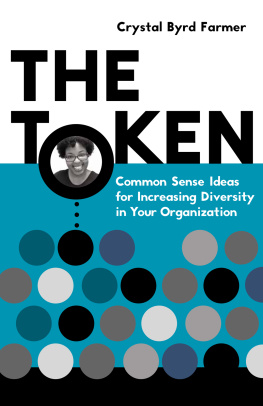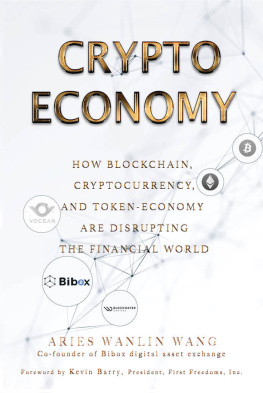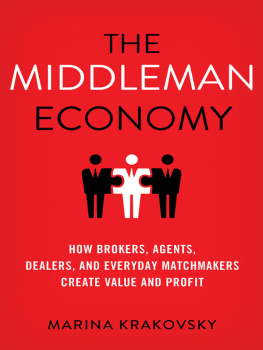Shermin Voshmgir - Token Economy: How the Web3 reinvents the Internet
Here you can read online Shermin Voshmgir - Token Economy: How the Web3 reinvents the Internet full text of the book (entire story) in english for free. Download pdf and epub, get meaning, cover and reviews about this ebook. year: 2020, publisher: Token Kitchen, genre: Politics. Description of the work, (preface) as well as reviews are available. Best literature library LitArk.com created for fans of good reading and offers a wide selection of genres:
Romance novel
Science fiction
Adventure
Detective
Science
History
Home and family
Prose
Art
Politics
Computer
Non-fiction
Religion
Business
Children
Humor
Choose a favorite category and find really read worthwhile books. Enjoy immersion in the world of imagination, feel the emotions of the characters or learn something new for yourself, make an fascinating discovery.
- Book:Token Economy: How the Web3 reinvents the Internet
- Author:
- Publisher:Token Kitchen
- Genre:
- Year:2020
- Rating:4 / 5
- Favourites:Add to favourites
- Your mark:
- 80
- 1
- 2
- 3
- 4
- 5
Token Economy: How the Web3 reinvents the Internet: summary, description and annotation
We offer to read an annotation, description, summary or preface (depends on what the author of the book "Token Economy: How the Web3 reinvents the Internet" wrote himself). If you haven't found the necessary information about the book — write in the comments, we will try to find it.
Token Economy: How the Web3 reinvents the Internet — read online for free the complete book (whole text) full work
Below is the text of the book, divided by pages. System saving the place of the last page read, allows you to conveniently read the book "Token Economy: How the Web3 reinvents the Internet" online for free, without having to search again every time where you left off. Put a bookmark, and you can go to the page where you finished reading at any time.
Font size:
Interval:
Bookmark:
Token Economy: How the Web3 reinvents the Internet
Second edition, first amended printing, November 2020
The first edition was published in June 2019 under the title Token Economy: How Blockchain & Smart Contracts revolutionize the Economy by BlockchainHub Berlin and had two amended editions.
Author: Shermin Voshmgir
Publisher: Token Kitchen
Alte Sch nhauserstrasse 9, 10119 Berlin
http://token.kitchen
Design: Justyna Zubrycka
Production: Caroline Helbing
Copy edit: Paisley Prophet
Cover design: Carmen Fuchs
Ebook layout: Shermin Voshmgir
Copyleft 2020, Shermin Voshmgir: Creative Commons - CC BY-NC-SA : This license allows reusers to distribute, remix, adapt, and build upon the material in any medium or format for noncommercial purposes only, and only so long as attribution is given to the creator. If you remix, adapt, or build upon the material, you must license the modified material under identical terms. For commercial permissions contact: hello@token.kitchen
ISBN: 978-3-9821038-3-9
A paperback edition is available as ISBN: 978-3-9821038-1-5
A hardcover edition is available as ISBN: 978-3-9821038-4-6
~
Shermin Voshmgir is the founder of BlockchainHub in Berlin and the director of the Research Institute for Cryptoeconomics at the Vienna University of Economics. In the past, she was a curator of TheDAO and advisor to various Web3 startups like Jolocom, Wunder, and also the Estonian E-residency program. In addition to her studies at the Vienna University of Economics, she studied film and drama in Madrid. Her past work experience ranges from Internet startups and research to art. She is Austrian, with Iranian roots, and lives in both Vienna and Berlin.
This book is an attempt to summarize existing knowledge about blockchain networks and other distributed ledgers as the backbone of the Web3, and contextualize the socio-economic implications of the Web3 applications, from smart contracts, tokens, DAOs to the concepts of money, economics, governance and decentralized finance (DeFi). It builds on the educational work that we started at BlockchainHub, an Info:Hub and Thinking:Hub based in Berlin, with the aim to make the Web3 accessible to a general audience.
Blockchainhub.net was the first website to systematically compile and disseminate blockchain and Web3 knowledge to a general audience and has been operational since 2015, first with a series of blog posts, which were later compiled and contextualized in the Blockchain Handbook, available for free.
Token Economy builds on the legacy of the past activities and goes one step beyond: The focus is now on tokens as the atomic unit of the Web3. The basic structure of the second edition of this book is the same as the first edition, with slightly updated content of existing chapters, minor corrections, revised terminology and four additional chapters: User-Centric Identities, Privacy Tokens, Lending Tokens, and How to Design a Token System.
While some readers might have a good understanding of blockchain networks and similar distributed ledgers, it is assumed that many readers still need an introduction to the topic. Without an understanding of the fundamental building blocks of blockchains, smart contracts, and the Web3, it will be hard for readers to assess how, when, and why token use cases might be a game changer. This book provides a general overview of the underlying technology and resulting socio-economic implications thereof, before deep-diving into the topic of tokens.
Chronological reading is recommended, especially for readers who are new to the topic. However, the book also works in a modular way, allowing for cross-reading between chapters. Certain sub-chapters of the first part might be considered to have too much detail for some readers and can easily be skipped. Some basic information on the cryptoeconomic mechanisms behind blockchain networks, and Bitcoin in particular, might be repeated over several chapters. Assuming that many readers will cross-read and might skip some chapters, this minimal repetition is intentional, as a basic understanding of the consensus mechanism behind public distributed ledgers is essential to the understanding of many of the other chapters.
In some cases, complementary technologies or the names of start-ups will be briefly mentioned to make the technology and its use cases more tangible, without describing them in detail. Certain topics can only be briefly explained on a high level, as a more thorough explanation would be beyond the scope of this book. In such cases, the references at the end of each chapter can help to deep-dive into the respective sections of interest.
Given the broad range and multidisciplinary nature of the topics discussed, it might be hard to please the needs of all readers, since not all specialist terms can be explained. It is assumed that the reader will conduct an independent Internet search in such cases.
The graphics in this book intend to visualize the core message of the topics discussed. They sometimes use metaphors or apply an intentional level of abstraction to allow for better understanding, especially for those who are new to the topic. Due to the emerging nature of token applications and their underlying Web3 networks, some details of the projects mentioned in this book might have become obsolete by the time of reading the book. The overall content of this book, however, is structured in a way that the general information will remain relevant.

Tokens are to the Web3 what websites were to the Web1. With the emergence of the WWW in 1991, Tim Berner Lee introduced a new standard that allowed us to create visually appealing web pages with just a few lines of code, and surf the Internet following links, instead of using command-line interfaces. Back in the early 1990s, most people did not know how to code HTML, or how to create appealing, meaningful, user-friendly websites. It took us almost a decade to figure out how to use webpages beyond the scope of online directories and online billboards, and when we did, the Web2 emerged. Compared to those early days of the Web, we are at a very similar stage when it comes to understanding what we can potentially do with cryptographic tokens. While it has become easy to create a token with a few lines of code, the understanding of how to apply these tokens is still vague. Even though there are already more than 5400 publicly traded tokens listed on Coinmarketcap at the time of writing this book, most of these tokens still lack proper design; many of these might, therefore, soon fail simply because of that.
The technology is still in its early stages, rapidly evolving, with the potential to uproot many industries, in particular money and finance, including government and governance. However, we currently lack best practices, while simultaneously dealing with a myriad of technological and legal challenges. We also lack substantial education around the mechanisms, potentials, threats, and state of the technology, including its socio-economic implications.
Buzzwords like smart contracts, cryptocurrencies, and tokens add to the confusion of what is what. Partial and one-sided knowledge seem to be on the rise, but the big picture of why and how Web3 networks could prove to be one of the biggest game-changing innovations in the years to come is still vague. The media keeps referring to cryptocurrencies, even when talking of non-currency tokens, while reducing the underlying blockchain networks to objects of speculation, instead of focusing on the fact that they provide - first and foremost - a promising governance infrastructure that could resolve many problems of the Internet we use today, such as: (a) the fact that we have no control over what happens with our private data, (b) the lack of transparency along the supply chain of goods, services, and financial payments, or (c) the fact that the Internet lacks an inherent payment settlement layer, forcing us to rely on trusted Internet platforms such as Amazon, Airbnb, or Uber.
Font size:
Interval:
Bookmark:
Similar books «Token Economy: How the Web3 reinvents the Internet»
Look at similar books to Token Economy: How the Web3 reinvents the Internet. We have selected literature similar in name and meaning in the hope of providing readers with more options to find new, interesting, not yet read works.
Discussion, reviews of the book Token Economy: How the Web3 reinvents the Internet and just readers' own opinions. Leave your comments, write what you think about the work, its meaning or the main characters. Specify what exactly you liked and what you didn't like, and why you think so.

